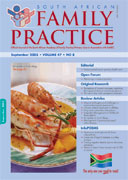Review: An update on food allergy: What every practitioner should know.
Abstract
Adverse reactions to food are a common occurrence in clinical practice. Some of these reactions are “true food allergies while others represent various forms of “food intolerance, or toxicity. There has been a real increase in true food allergies, e.g. peanut allergy, which has accompanied the general increase in allergic diseases worldwide. In practice, however, more frequently doctors encounter patients with “atypical or delayed adverse reactions to food which, are not Type I IgE dependent reactions, and in whom conventional allergy tests are usually unhelpful. The identification of the triggers of such reactions requires careful history taking and in some cases can be confirmed by new tests. The corner stone of the management of food allergies is identification and avoidance. No commercial immunotherapy vaccines are available for clinical use for food allergy. It is important to take care with influenza or yellow fever vaccinations in egg allergy subjects. MMR by contrast, may be safely administered to egg allergic subjects for the future, novel genetically engineered proteins have a real potential for allergenicity. (SA Fam Pract 2004;47(8): 42-48)
Published
2005-09-01
Section
Review Articles
By submitting manuscripts to SAFP, authors of original articles are assigning copyright to the South African Academy of Family Physicians. Copyright of review articles are assigned to the Publisher, Medpharm Publications (Pty) Ltd, unless otherwise specified. Authors may use their own work after publication without written permission, provided they acknowledge the original source. Individuals and academic institutions may freely copy and distribute articles published in SAFP for educational and research purposes without obtaining permission.

